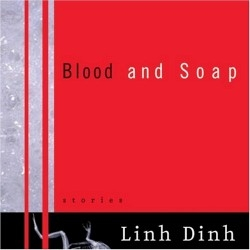Blood and Soap
This book is held together, curiously, by scissors. Scissors are the weapon of choice for the characters presiding in this collection of stories-although fountain pens, knives, and curses are also popular. But why shouldn’t scissors be the ultimate leveler in a collection obsessed with the importance of words? In “Prisoner with a Dictionary,” the author writes that his prisoner “was living inside this language all the time, like a fetus thriving inside a womb.” This prisoner memorizes a foreign language dictionary, forgetting his native tongue and remaking himself definition by definition.
He is just one of Dinh’s characters who are consumed by language. Others include an enthusiast who teaches a nonsense language he believes to be English, and an illiterate bicycle repairman who is saved during a war by the sheer quantity of books he owns. If there were a religion in this collection, it would be words. But apparently, language is quite an immoral god. Murders, voyeurs, and frauds are just a few of its followers.
The quality of dissatisfaction that dogs Dinh’s collection is perhaps due to the vagrancy of its protagonists. Dinh’s parables are irreverent, his fates tragic, his one-sentence stories bewildering. The redemption of Blood and Soap lies not only in its ability to surprise, but also in its tongue-in-cheek humor. Despite the fact that Dinh has been accepted into the American writing world-to the extent that he received the 1993 Pew Fellowship-his writing seems unfamiliar. His Vietnamese birth or current Italian residence could be to blame, but it seems more likely that this quality of foreignness is deliberate and makes the American humor more pungent. “Stewart Crenshaw” tells the tale of a white man who willingly becomes a slave. In the story, the man’s manuscript is never found, but books attributed to him include Absalom! Absalom! and The Autobiography of Malcolm X.
Regardless of such injections of humor, it is clear that there is much more blood than soap in Dinh’s collection. A headless rooster, a war-bound lover, a rapist, and a couple of murderers reside in the three pages of “Eight Plots” alone. Dinh’s stories explore how violence is fascinating, how repulsion and attraction are not necessarily exclusive. In “A Moving Exhibition of Reptiles,” the narrator describes his show as “where even the most insensate and shell-shocked among you can experience such a rare, lost emotion as revulsion mixed with longing and pity.” An apt description of Blood and Soap, as well.
Reviewed by
Erica Wright
Disclosure: This article is not an endorsement, but a review. The publisher of this book provided free copies of the book to have their book reviewed by a professional reviewer. No fee was paid by the publisher for this review. Foreword Reviews only recommends books that we love. Foreword Magazine, Inc. is disclosing this in accordance with the Federal Trade Commission’s 16 CFR, Part 255.

